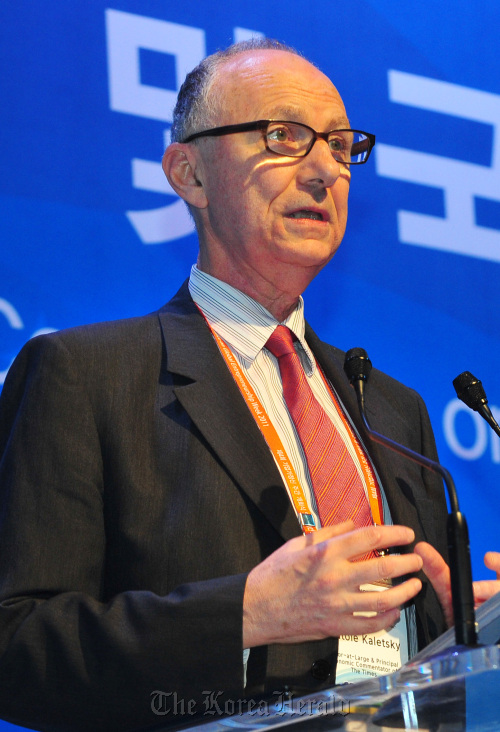In his book “Capitalism 4.0,” prominent journalist/economist Anatole Kaletsky predicts a sea change in the relationship between government and the market.
The fourth stage of capitalism, he argues, is being created by a new form of collaboration that transcends both unbridled capitalism and state interventionism. The “birth of a new economy” would also mean a new era of healthy growth for emerging powers like South Korea, he said.
 |
Anatole Kaletsky |
“For Korea, it’s going to be an opportunity,” Kaletsky, editor-at-large of the Times of London, told a news conference in Seoul on Monday. The nation’s practical vision, mature democracy and cutting-edge technology would position it to take better advantage of the fundamental transition, he said.
Kaletsky was visiting Korea to take part in the International Conference on Global Entrepreneurship.
His theory has recently attracted keen attention here as policymakers and economists are striving to find alternative models to the country’s decades-long state-driven industrialization and chaebol-dominated market.
In his 2010 book, he carves up modern economic history into four phases. Capitalism 1.0 until the 1930s was the era of the classical laissez-faire capitalism. Keynesianism dominated Capitalism 2.0 until the 1970s, and then “market fundamentalism” ruled until the 2008-09 financial catastrophe.
Capitalism 4.0 is characterized by a new level of efficient and responsible balance between the state and markets. Regarding the government’s role, he focuses on macro prudential regulation, financial supervision and the development of new industries that require large-scale, long-term investments.
“There’s not enough recognition of the need for the reconstruction (of the economic system) for those countries that lead the world. New ideas have to come from somewhere else,” he said.
A place where they can come from, he said, is Asia.
But he is skeptical of China, which lacks democracy, and Japan, which has suffered from “not just economic, but political and cultural paralysis for the last 30 years.”
“Countries such as the U.S. and in Europe do not have political visions that allow those technologies to be developed. Those that have a combination of technology development and political visions will have a major competitive advantage in the long term. Korea will well be one of those countries.”
By Shin Hyon-hee (
heeshin@heraldcorp.com)







![[Weekender] Korea's traditional sauce culture gains global recognition](http://res.heraldm.com/phpwas/restmb_idxmake.php?idx=644&simg=/content/image/2024/11/21/20241121050153_0.jpg)
